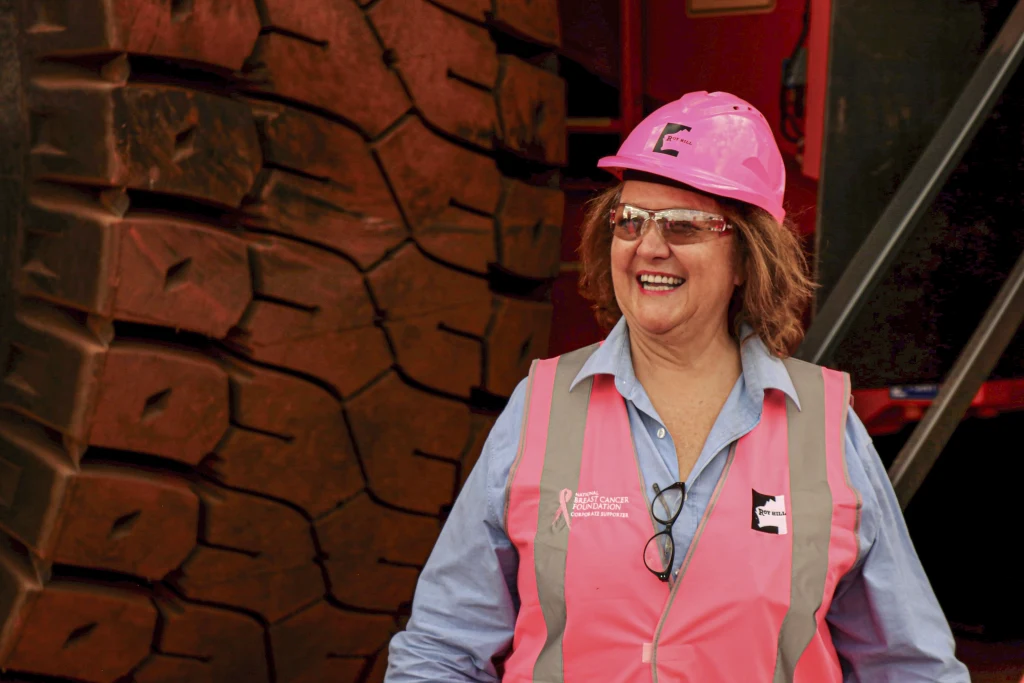
Article by Jesinta Burton, courtesy of WA Today.

Mining magnate Gina Rinehart’s flagship company Roy Hill has recorded another bumper profit following record shipments from its namesake iron ore mine, but warned government tape threatened to stifle plans underpinning its continued operation.
The miner, controlled by Rinehart’s Hancock Prospecting empire, posted a full-year net profit of $3.2 billion in the 2024 financial year, up from the $2.7 billion recorded last year.
The company, led by the country’s richest person, shipped a record 64 million tonnes of iron ore in the year to June and injected more than $2 billion into the country’s economy.
It also shelled out $1.4 billion in corporate income tax and poured $655 million worth of royalties into Western Australia’s coffers.
Roy Hill committed more than half a billion dollars to new capital, from the expansion of its autonomous haulage system to the renewal of mine and rail equipment and new infrastructure.
The integrated operation comprises an open pit iron ore mine about 110 kilometres north of Newman, a processing plant, 340-kilometre railway to the port of Port Hedland and a two-berth iron ore port facility.
The Roy Hill mine has operated for just shy of a decade and employs more than 2800 people.
Rinehart, who is estimated to be worth more than $45 billion, used the company results to launch yet another blistering tirade against government tape — which Hancock Prospecting operations chief Gerhard Veldsman said threatened to interrupt plans to maintain production at the decade-old mine.
The mining magnate warned the industry was facing threats on multiple fronts — including regulatory burdens which were delaying or preventing new projects, and impractical policies which could stymie investment and compromise living standards.
She also revived her campaign for the federal government to implement special economic zones with less burdensome regulations and tax cuts, as have been introduced in China, referencing the Minerals Council of Australia’s claim that 80 per cent of major projects before regulators are being abandoned.
“Australia’s increasing government intervention combined with ideological and expensive or impractical policies is negatively affecting new mining investment, which will lead to lower living standards,” she said.
“This should be a wake-up call to all Australians. We should not take our standard of living for granted.
“Australia has now seen six consecutive quarters of falling living standards, and the highest rate of business failure on record.”
Veldsman said this year’s profit was the basis for reinvestment in the business that would underpin staff training, lucrative employment opportunities and further mining projects that would pay dividends.
But he said that hinged on “timely and practical” government approvals, which were required as the Roy Hill operation neared the end of its expected mine life.
“As Mrs Rinehart has previously warned, the Roy Hill mine life is finite and expected to end in the early 2030s without further investment, which requires timely and practical approvals,” he said.
“Unnecessarily long, duplicative, and even contradictory conditions and processes at the state and federal level impose significant costs and must be cut to ensure that the mines of the future can be developed, their contributions continue, and to be able to maintain our living standards.”
The comments come just weeks after Rinehart used the approval of Hancock Prospecting’s $600 million McPhee project to air concerns amid debate over the government’s environmental reforms.
The federal government has been attempting to overhaul environmental laws and establish a standalone Environmental Protection Agency, but the legislation has stalled following a tug-of-war with the Greens and the opposition.
The plan aims to stop damage to critical habitats and strengthening the Environment Protection Biodiversity Conservation Act, but the business community claims it could duplicate approvals, delay and blow out costs on major projects and deter investment.
Roy Hill is the largest revenue generator for Hancock Prospecting, which holds a 70 per cent stake in the company.
The equity interest is held by a consortium comprising Japanese conglomerate Marubeni Corporation, South Korean steelmaker POSCO, and China Steel Corporation.















